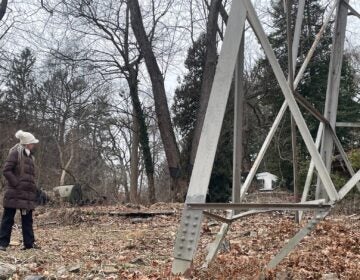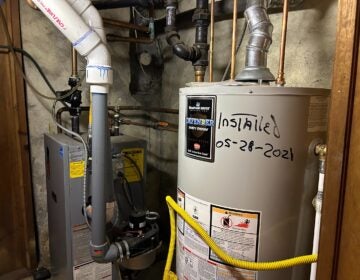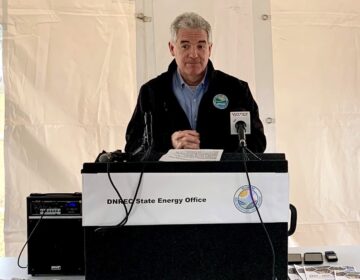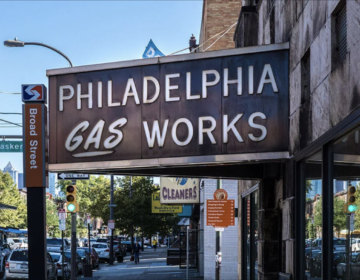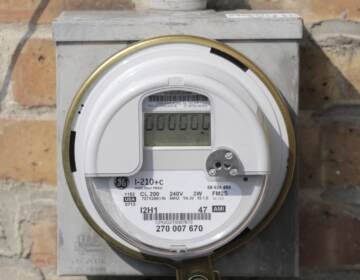Del. Gov. Matt Meyer searches for a new Public Advocate in the face of anger over skyrocketing utility bills
Delmarva’s customers say they can’t afford gas and electric bills that doubled, and in some cases tripled, in January. Gov. Meyer says he’s in search of a new Public Advocate.
Listen 1:56
File - Delaware Gov. Matt Meyer in 2023 (Matt Meyer campaign)
From Philly and the Pa. suburbs to South Jersey and Delaware, what would you like WHYY News to cover? Let us know!
Delaware Gov. Matt Meyer on Wednesday said he is in search of a new Public Advocate who will take a more aggressive approach when advocating for affordable utility bills on behalf of consumers.
The announcement comes a month after Delmarva Power customers throughout the state began to complain about their energy bills doubling, and in some cases tripling, since the beginning of winter.
The newly elected Democratic governor also plans to appoint one new public service commissioner.
“Just as aggressively as Delmarva Power presents a case for its rates, we have to make sure the Public Advocate and Public Service Commission are protecting ratepayers and trying to get rates as low as possible,” Meyer said. “It appears that’s not happening. There are a number of problems [causing high bills] and we want to get to the heart of the problem and take action.”
Meyer is calling for diverse energy sources in the state, while also demanding Delmarva adjust bills that rose significantly over the winter months.
“Large increases in bills on working families who are simply trying to heat their home, power their home, are not acceptable in 2025,” he said. “And we’re going to get people in place to fight like crazy to make sure Delmarva’s feet are held to the fire.”
Since the beginning of February, Delmarva customers have taken their complaints to social media and neighborhood apps. The upset over the rising bills is so widespread that a “Delmarva Victims” Facebook group garnered 14,000 members.
On the Nextdoor app, neighbors also united over the dismay.
“Delmarva really seems out of control. Greed has definitely set in!” one user wrote in February.
Delmarva Power said the cold weather, which the region has not experienced since the 2014 polar vortex, has caused people to use more gas and electricity to heat their homes, and is driving the increased costs. In fact, January’s heating demand in Delaware outpaced every year since 2000. Several bills provided to WHYY affirmed increased gas usage in January drove the recent jump in utility bills.
Average temperatures in January in some parts of Delaware were between 3 to 6 degrees colder than average, according to the National Oceanic and Atmospheric Administration, a trend reflected nationwide.
Philip Vavala, regional president for Delmarva Power, said that even if a resident leaves their thermostat on the same setting regardless of the outside temperature, a heating system must work harder during extremely cold weather.
“Heating systems struggle more when you’re in extreme periods of cold, and it’s been recognized by the industry that there was some pretty significant weather [in January],” he said.
Delmarva customers are not alone. PECO also reported near-record usage in January, resulting in higher costs for Pennsylvanians.
Vavala said Delmarva is committed to working with the governor and others to address energy bills. In response to the challenges faced by ratepayers, Delmarva suspended late payment fees, extended repayment periods and halted shutoffs.
Distribution vs. supply
All gas and electric bills have two separate payment structures — one for the transportation and distribution of the energy to one’s home, and the other for the actual cost of the energy itself or supply.
While Delmarva said gas usage is the primary driver for higher bills, in June, electricity distribution rates jumped 3.47% after approval by the Delaware Public Service Commission in April.
The Delaware Public Service Commission regulates investor-owned utilities operating in the state, as well as the safety of natural gas distribution. The commission evaluates delivery and administrative costs associated with natural gas and electric distribution, and determines how Delmarva can recover these costs from ratepayers. The distribution charges are the source of the utility’s profits, while the price of gas and electricity purchased by the utility are simply passed on to the customer. The Public Advocate’s role in the ratemaking proceedings is to ensure affordability, especially since the utilities hold a monopoly on distribution.
The PSC declined to comment on Meyer’s energy proposal, while the state’s acting Public Advocate, Ruth Ann Price, did not respond to requests for comment.
Delmarva also increased its electric and gas supply and delivery rates by a total of 3% in October for those who get both, or electric-only services. Gas-only customers experienced a 6% increase to their total gas bill due to increases in supply and delivery. Electric-only customers saw a total of 3% increase, primarily for supply.
These had been approved by the PSC in a process where the state’s Public Advocate represents the interests of ratepayers. In October, the company filed for an additional 18.6% gas rate hike, which has yet to be approved. Delmarva said the request — the company’s first of its kind since 2022 — was needed to upgrade its liquid natural gas plant, and maintain and replace pipelines.
Legislators in Delaware say they’re not buying Delmarva’s excuse for rising bills — with Democrats pointing to increased market prices for gas and Republicans pointing fingers at renewable energy regulations forcing companies to pay out when not meeting renewable energy goals.
Role of green energy and the region’s power grid operator
While some blame the skyrocketing utility bills on fees associated with renewable energy programs, Vavala argues that both those fees and rising natural gas prices contribute to only a small fraction of a person’s bill.
While Delmarva paid almost $13 million into the state’s renewable energy portfolio last year, charges related to renewable compliance makeup around 3% of a customer’s bill, according to those reviewed by WHYY.
“Yes, there is a component of the bill that’s related to transmission costs and supply costs. Yes, there’s a component of the bill that’s related to green energy and programs to support that,” Vavala said. “But it is not the key driver in what we’ve seen in terms of this phenomenon occurring for our customers.”
Adding to confusion among ratepayers, Delmarva last November began to include a breakdown of delivery and supply charges on its bills.
Customers have always paid these charges, but they weren’t previously explained on their bills. Delaware residents said they were shocked to learn for the first time that these distribution fees account for more than half of their bill.
Though customers have always paid for delivery and supply, Delmarva bills indicate Delaware residents paid slightly more for the supply of gas in January, which had nothing to do with green energy, but rather cold temperatures.
“Weather does cause increased demand, and so supply-demand crunch, price goes up. So, the reason that people’s bills are going up so high is that, in part, they’re using more, and, in part, the price that is set by the wholesale market, which is also increasing,” said Shelley Welton, presidential distinguished professor of law and energy policy at Penn Carey Law and the Kleinman Center for Energy Policy.
The supply price increase for Delmarva customers in January shows a hike of about 1 cent per 100 cubic feet over December’s bills.
A spokesperson for Delmarva Power said it purchases about half of what it projects it will need in the summer when prices are low.
“Locking in prices, also known as hedging, seeks to limit the impact of wholesale price volatility that may occur throughout the year,” said spokesperson Zach Chizar. “We also continue to make upgrades to our Liquefied Natural Gas Plant in Wilmington, replacing and upgrading systems that give customers a more predictable gas cost rate so that we can secure more natural gas and avoid challenges during peak periods.”
Adding to the shocking cost could be that some January bills encompassed 36 days, rather than the typical 30 days.
One of Meyer’s proposals includes working to expand the state’s renewable energy portfolio.
“The more we get — solar, offshore wind, various alternatives — will help us expand the diversity of energy sources, increase the supply of sustainable energy sources, and in many cases, sources that are good for the environment for the long term,” he said.
Welton said decreasing reliance on natural gas could help control prices. States that rely heavily on natural gas are facing greater energy costs than in areas that use more renewable energy, she said. Like many, she points to the region’s power grid operator, PJM Interconnection.
“You have tons of new resources lined up asking to connect to the grid — and these are mostly clean energy resources. And if you’ve got these resources online, if you’ve got a lot more capacity in the region, you would see prices start to come down. But PJM has been very slow to help these resources connect to the grid,” Welton said.
While freezing temperatures and the resulting usage drove up utility bills in January, costs of electricity are also determined by a complex pricing system overseen by PJM and are expected to climb for Delawareans starting in July, regardless of the weather. That’s because of an increase in certain electricity generation fees, called capacity costs, that the grid operator announced last year. The move will impact 65 million residents in the Mid-Atlantic and Great Lakes regions. In January, PJM agreed to a price cap after Pennsylvania Gov. Josh Shapiro sued.
Delmarva’s Vavala said it’s important PJM incentivizes and encourages all forms of generation — whether that’s renewables, nuclear or traditional forms of power such as natural gas. He also calls for improved transparency in the rate-making process and about investment portfolios.
Legislative efforts to lessen the burden on ratepayers
Gov. Meyer also wants to direct the Delaware Public Service Commission to focus more attention on the impact of price hikes to ratepayers. That includes reviewing and overhauling the PSC’s process that allows ratepayers to challenge unfair charges.
Meyer said he also supports a package of legislation sponsored by state Sen. Stephanie Hansen, D-Middletown, which aims to show how rates are approved.
One proposal would change the standards the PSC uses to determine acceptable rate increases. Currently, Delaware uses a “business judgment rule,” which means the PSC may not prohibit utilities from increasing rates even if they overspend. Hansen’s legislation would allow the PSC to approve rate increases based on a “prudent standard,” which would give the commission the ability to deny certain expenses and costs.
A complementary bill would restrict Delmarva from recovering costs associated with campaigning and political contributions from ratepayers, and set a cap on capital expenses recoverable by the company.
Hansen has also introduced legislation to increase transparency about how PJM Interconnection votes on issues, such as energy costs.
The Democrat is also partnering with state Rep. Debra Heffernan, D-Bellefonte, on a bill that aims to offer financial assistance to anyone who does not qualify for the LIHEAP program, which helps low-income households pay their heating bills. Heffernan’s legislation would expand assistance to moderate-income households.
Funding would come from the Regional Greenhouse Gas Initiative, or RGGI, which aims to cap and reduce carbon emissions from the power sector. Another portion of the funding would come from alternative compliance payments, which are paid by electric companies that don’t meet renewable energy targets.
“We’ve got seniors and many folks who are disabled, are veterans, and they were just shocked by the prices. And some of them are truly having to make the decision of, ‘Do I buy groceries this week or do I pay my electric [and gas] bill?’” Hansen said. “We have to make sure that we’re doing something to help these folks.”
Republican state Rep. Bryan Shupe, R-Milford, blames the regulations that require companies such as Delmarva to pay fees if they don’t meet certain renewable energy targets.
“The state of Delaware mandated the private market, or tried to strangle the private market, by mandating that businesses follow a timeline for renewable energies that were not realistic,” Shupe said. “In reality, what happened was these businesses could not put these green energy sources online because of technology and infrastructure in the same demand that the government required them to.”
Shupe said Gov. Meyer’s proposal “lacks long-term solutions for energy reliability, grid modernization and diversification of Delaware’s energy portfolio.” He said the proposal imposes further restrictions on the free market, which he believes could lead to even higher costs for consumers.
In the meantime, Vavala encourages ratepayers to request a home energy audit to learn how to use their gas more efficiently, and to take advantage of the LIHEAP program, if eligible.
“But really, it’s in efficiency, monitoring, and using the tools that we have … to understand your bill, to understand what your largest energy consumers are within your home, and really ultimately start to manage that usage down a little,” he said.

Get daily updates from WHYY News!
WHYY is your source for fact-based, in-depth journalism and information. As a nonprofit organization, we rely on financial support from readers like you. Please give today.



